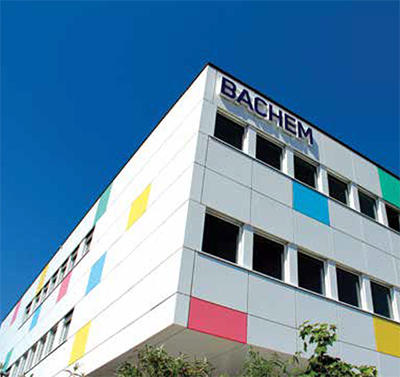
I think it is important for our customers to understand that the decision of the Bachem leadership to enter the field of oligonucleotide manufacturing was well-prepared and ultimately taken in line with the company’s long-term growth plan.
We are operative since 2019 and are gradually expanding our expert resource pool, capabilities and capacity for oligonucleotides.
We have been lucky to forge strong partnerships on the customer as well as on the supplier side and have been able to hire great oligonucleotide chemists to accelerate our organisational learning.
Despite having set ambitious goals we go step by step. Having said that, more and more we are shifting our focus from closing the oligo-specific technology gap to building a solid foundation for future growth.
Our large-scale facility will come online later in 2021. We took the time to thoughtfully design an equipment train featuring some innovative engineering solutions for increased utilisation flexibility and improved process control.
Then, later on our way to become a first-choice manufacturer for oligonucleotides, we hope to make our own contributions to advancing the drug class by making oligonucleotide API production more scalable and cost-effective.
The progress in oligonucleotide-based drug development directly translates into a growing number of granted marketing authorisations. We actually might be seeing additional approvals before the end of the year. In addition, there is a strong interest in the therapeutic application of antisense technology and non-coding RNA biology, which is reflected in an ever growing number of clinical programs in operation and in a global project portfolio that is spreading across a broader range of indications.
We therefore anticipate the demand for oligonucleotide custom manufacturing services to remain strong in the foreseeable future.
As for challenges: mastering oligonucleotide chemistry is not trivial, and building a track record of successfully completed scale-up projects is another major hurdle for every CMO entering the market.
In addition, building large-scale manufacturing facilities for oligonucleotides, meaning facilities with an output of 1-Mol per batch or more, is very expensive. At Bachem, a sizeable CAPEX budget has been granted to purchase special equipment and to build the necessary infrastructure.
Finally, almost the entire equipment train is custom-built. It is important to get the design details right, ideally on the first pass. We are lucky to have a strong engineering team on site to support these critical activities.

Similar to peptides, the manufacture of oligonucleotides requires expert knowledge in solidphase synthesis and protecting group chemistry. Downstream processing typically includes purification by chromatography and isolation by ultra/diafiltration techniques, precipitation and finally lyophilisation. The manufacture of peptide APIs follows the same basic principle. And it is the core technology Bachem has developed over decades.
Still, there are important differences between peptides and oligonucleotides. The synthesis in flow-through columns consumes large volumes of solvents and reagents for which our facility infrastructure will be appropriately expanded.
Furthermore, oligonucleotides are negatively charged and highly water soluble, requiring the handling of aqueous solutions throughout the entire downstream process.
And let’s not forget that oligonucleotide APIs, especially double stranded entities, are considerably larger then peptides and pose challenges also from an analytical point of view.
Overall, it is fair to say that our peptide manufacturing background and our analytical capabilities are certainly very helpful in our quest to build a successful oligonucleotide business.
Indeed, these are challenging times. COVID-19 affects all of us on a personal level, in our daily work life and social interactions.
Early on in the pandemic, Bachem received essential business status from the Swiss authorities, and we remain committed to our partners and patients, who depend on Bachem’s products and an uninterrupted drug supply.
Bachem’s corona task force monitors the COVID-19 pandemic closely and implements appropriate measures in a proactive way. In addition, employees are repeatedly trained in preventing infections and reminded not to become complacent in the process.
So far the virus has not impacted Bachem’s ability to produce, and so our oligonucleotide program is still on track. Fingers crossed that we continue navigating this situation successfully and can make a contribution in battling COVID-19.
Bachem is a leading, innovation-driven company specialising in the development and manufacture of peptides and oligonucleotides. With 50 years of experience and expertise Bachem provides products for research, clinical development and commercial application to pharmaceutical and biotechnology companies worldwide and offers a comprehensive range of services. www.bachem.com